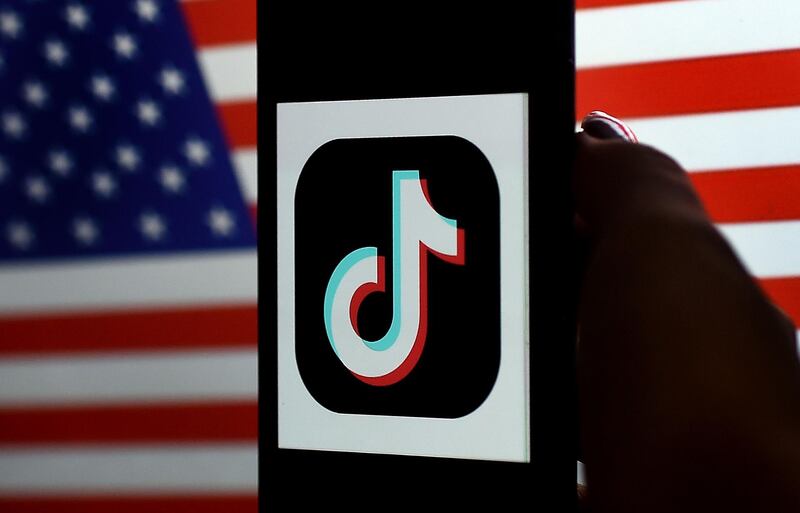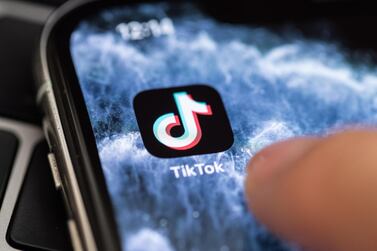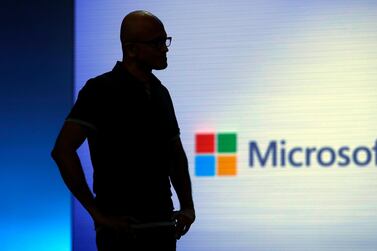President Donald Trump repeatedly insisted on Monday that any sale of TikTok’s US operations would have to include a substantial payment to the US – but it was not clear under what authority he can extract a payout.
It would be unprecedented, based on recent history, for the US government to collect a cut of a transaction involving companies in which it does not hold a stake. Mr Trump said the money would come from China or an American buyer such as Microsoft, Bloomberg reported on Monday.
“The United States should get a very large percentage of that price, because we’re making it possible,” Mr Trump told reporters at a news conference on Monday evening. “Whatever the number is, it would come from the sale, which nobody else would be thinking out but me, but that’s the way I think. And I think it’s very fair.”
Earlier in the day, Mr Trump said TikTok will have to close in the US by September 15 – unless there is a deal to sell the social network’s domestic operations to Microsoft or another American company.
Mr Trump set off a furious scramble over the fate of the Chinese-owned app on Friday, when he said he would ban the company’s operations through an executive action on Saturday. But the weekend passed without any official move from the White House, after the president spoke with Microsoft chief executive Satya Nadella about his company’s efforts to purchase the viral video application.
China’s government won’t accept an acquisition of TikTok’s US operations by Microsoft and may take action against Washington if a sale is forced, the state-run China Daily said in an editorial on Tuesday.
“China will by no means accept the ‘theft’ of a Chinese technology company, and it has plenty of ways to respond if the administration carries out its planned smash and grab,” the China Daily said, without specifying options. “With competitiveness now dependent on the ability to collect and use data, it offers an either-or choice of submission or mortal combat in the tech realm.”
Microsoft said in a blog post that it was aiming to complete a deal for TikTok’s operations in the US, as well as in Canada, Australia and New Zealand, no later than September 15. The White House had insisted upon that deadline, according to sources. It could prove an uphill climb, with key details for the deal – including price – still not worked out, Bloomberg reported citing sources.
Microsoft’s blog post also said it’s committed to “providing proper economic benefits to the United States, including the United States Treasury.” That language referred to tax revenue and job creation, according to a source – rather than some sort of special transaction fee.
Mr Trump compared the arrangement to landlord-tenant dynamics. “Without the lease, the tenant doesn’t have the value,” he said. “Well, we’re sort of in a certain way the lease. We make it possible to have this great success.”
The US assesses fees associated with deals under review by the Committee on Foreign Investment in the United States, or CFIUS, which investigates overseas acquisitions of US businesses. But those charges – set on a sliding scale and going no higher than $300,000 (Dh1.1 million) – didn’t fit what Mr Trump described.
CFIUS has been reviewing ByteDance’s 2017 purchase of the lip-synching app Musical.ly that was later folded into TikTok.
The White House has said it is concerned that ByteDance could be compelled to hand over American users’ data to Beijing or use the app to influence the 165 million Americans, and more than 2 billion users globally, who have downloaded it. And Mr Trump has looked to ratchet up pressure on China ahead of November’s election, frustrated by slow implementation of the trade pact inked earlier this year and the spread of the coronavirus for which he blames China.
White House trade adviser Peter Navarro on Monday also suggested that Microsoft could divest its holdings in China if it were to buy TikTok.
“So the question is, is Microsoft going to be compromised?” Mr Navarro said in an interview with CNN. “Maybe Microsoft could divest its Chinese holdings?”
In an earlier interview with Fox News, Navarro said any potential buyer of TikTok that has operations in China could be a problem.
Navarro cited Microsoft’s Bing search engine and Skype platform, saying they “effectively are enablers of Chinese censorship, surveillance and monitoring”.
Microsoft has over 6,000 employees in China and offices in Beijing, Shanghai and Suzhou, according to a Reuters report.
While the company has been there for decades, business from China accounts for just over 1 per cent of the company’s revenue, Bloomberg reported Microsoft president and chief legal officer Brad Smith stating at a conference in January.
Widespread piracy of Windows and Office once prevented the company’s cash cow from bringing in money. The company is now pushing its Azure cloud service to customers in China, via a partnership with local data service provider 21Vianet.
Its crown jewel is arguably a research center in Beijing, which has produced a number of alumni who have gone on to executive positions at Alibaba, ByteDance, Xiaomi, and facial recognition unicorns Sensetime and Megvii.
It also was the site of origin for the so-called “ResNet” paper, currently the most-cited AI paper, Reuters reported, citing Google scholar metrics.









